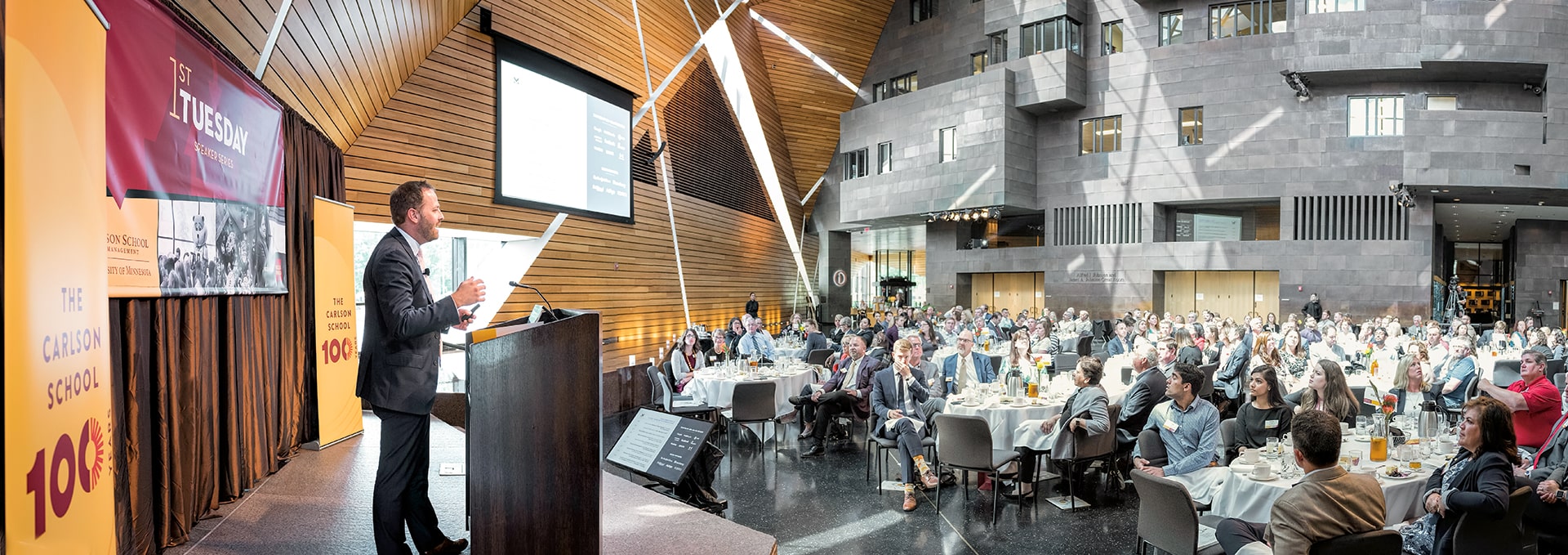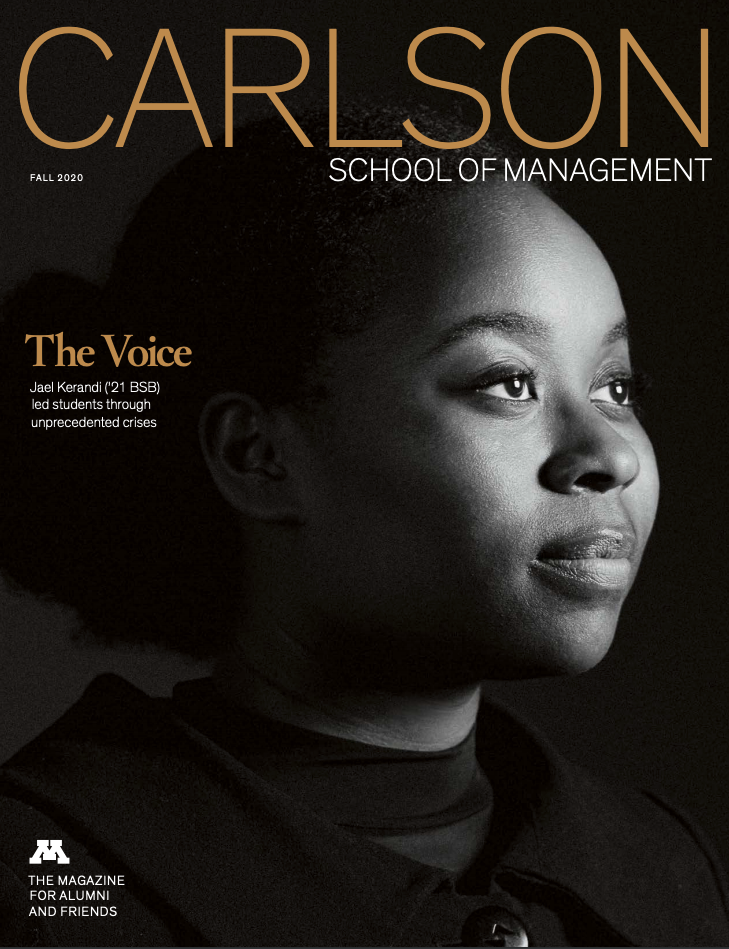
Survey Says
Tuesday, September 22, 2020
BY TIM GIHRING
How Morning Consult, led by Michael Ramlet, '09 BSB, is helping countries and companies navigate a world turned inside out.
Morning Consult, the polling firm, is a relative newcomer to the question business. Its CEO, Michael Ramlet, co-founded the firm seven years ago, before he was old enough to rent a car. But its scope and agility has given it formidable insight — what it calls data intelligence — into virtually every aspect of modern life. It surveys more than 20,000 people a day around the world, about everything from whether they trust the president to whether they trust the tap water.
Late last year, having asked people about the economy and their finances for more than two years, Morning Consult began sharing what it knew with the Federal Reserve. “We figured they were one of those organizations that is always looking for a better sense of what’s going on in the economy,” recalls Ramlet. “Little did we know it would soon be of tremendous importance.”
By spring 2020, with much of the world in lockdown, Morning Consult was flooded with data requests. John Leer, an economist with Morning Consult, was talking to international agencies who were suddenly having regular morning briefings. He was talking to the central bank of Germany, which was building a real-time indicator of the country’s economic activity. They all needed the latest data. “Everyone knew the global economy was in freefall,” says Leer, “but it was difficult to measure precisely.”
Morning Consult’s daily consumer confidence surveys are more like sonar pings, telling us where we are in the vast ocean between traditional reports.
For much of the past century, economic information has trickled out in quarterly reports, the way one is encouraged to check on investments. Morning Consult’s daily consumer confidence surveys — the same five questions, asked over and over—are more like sonar pings, telling us where we are in the vast ocean between traditional reports. In March, during the scramble to assess the pandemic’s fallout, the chief economist of Moody’s Analytics called Morning Consult’s model “the future.”
Morning Consult had in fact been preparing to package its comprehensive economic data sets, including its daily consumer confidence survey, in a new product called Economic Intelligence, which can divvy up data by more than 100 variables. It was slated to debut in the fall. Instead, it was released in April. “It felt like it was in the public interest,” says Leer.
Since then, of course, almost everything has become uncertain: the way we work, the way we learn, the way we shop. But to someone like Ramlet, whose business is uncertainty, the path forward is a matter of asking the right questions—so long as we’re prepared for the answers.
Ambition, served early
Ramlet grew up outside Madison, Wisconsin, a center of academia and politics, and eventually was drawn to both. He was a school government kind of kid. “Pretty precocious,” he says, “always liked to talk with people.” A top seller of wrapping paper for the school fundraiser.
When he entered the Carlson School, in 2005, he quickly sought out mentors. He met about once a week with John Stavig, director of the Gary S. Holmes Center for Entrepreneurship. He would commandeer the office of Assistant Dean of MBA and MS programs Phil Miller, who then ran the school’s Consulting Enterprise. He asked Associate Dean of Global Initiatives Steve Parente — who was then the professor and director of the Medical Industry Leadership Institute — to advise him on his senior thesis, one of the first at the business school since the 1940s.
In fact, Ramlet told Parente he’d spare him the hour a week of advising, instead presenting him with something he’d already been working on: a kind of news reader, summarizing articles about the healthcare industry and policy. He’d been emailing it every morning to a growing list of subscribers.
“Here was this brash, young sophomore who comes barging into my office, saying, ‘You don’t know me, but you will,’” recalls Parente. He was impressed, if bemused. He eventually took Ramlet on trips to Washington, D.C., introducing him in health policy circles. After graduation, Ramlet got a job there in a prominent new think tank, working on healthcare policy just as the Affordable Care Act was taking root.
But Ramlet never stopped sending out his newsletter. It might go dark for weeks at a time if he got busy. It might arrive closer to brunch than breakfast if he had been out the night before. Yet it still felt important to Ramlet and his readers, who finally gave it a proper name after Ramlet surveyed them: Morning Consult. It was the company’s first poll.
Going online
Back in 2006, Ramlet had interned in the U.S. Senate, where he met Kyle Dropp, a fellow Wisconsinite. They were the first interns to arrive that summer, and for a month it was just the two of them. They stayed in touch as Dropp went on to earn a PhD in political science from Stanford, thinking about political persuasion and how to measure its effects.
Polls were still largely conducted by landline telephone then, even as fewer people were picking up. Ramlet, who calls this approach “deeply inefficient and wildly expensive,” was intrigued by Dropp’s research into reaching people online and by cell. He envisioned a media company writing up the results of more immediate, more robust polling than anyone else had attempted — as he put it, “the Bloomberg Terminal of public opinion research data.”
By 2013, Ramlet and Dropp were ready. Parente and a fellow angel investor had given them $30,000 in start-up funding, and Parente helped Ramlet set up an LLC using Legal Zoom and a Wells Fargo account. They just needed something to survey.
They decided to poll whether the young and uninsured would sign up for health insurance through the exchanges established by the Affordable Care Act. It was an important question: the exchanges were about to open, and their success depended on the participation of young, healthy people. They built a simple WordPress website, surveyed 2,000 people online — roughly twice the usual number— and found that a strong majority planned to sign up. They released the results a day before the exchanges went live, and the White House led its afternoon briefing with the Morning Consult survey.
“Two weeks later we got a $168,000 check,” Ramlet says, from a Fortune 500 healthcare company.
New polls, new insights
The online approach was partly pragmatic, Dropp says, as Morning Consult lacked the calling centers of established polling firms and the money to staff them. But cutting the cord has also opened new opportunities for research, from showing people videos to having them read long articles. And, of course, it offers anonymity. In 2015, with Donald Trump leading fellow Republicans in the polls, Morning Consult saw a chance to test this. They surveyed about 2,400 Republicans, starting online and then continuing either online, with a live interviewer over the phone, or with an automated voice. Sure enough, Trump performed 6 to 8 points better when people didn’t have to admit their preference to a live interviewer. Morning Consult had the first real evidence of “shy Trump supporters.”
“That survey put us on the map,” Ramlet says. Morning Consult now counts half the Fortune 500 as clients and is valued around $300 million. Ramlet, who is in his early 30s, got married in Chicago two days before the “shy Trump voter” release and has remained there, while a couple hundred employees are spread from California to D.C., connected by Zoom.
Libby Isenstein, who came to Morning Consult in 2016, is now the company’s Vice President of Product and has helped it expand from political polling to contracting for custom surveys to developing its own products. Brand Intelligence, its flagship product, tracks what people in several countries think about thousands of brands and goods. Its subscribers, who mostly work in marketing and communications, can organize the data however they want, comparing brands or demographics to better understand their audience. Economic Intelligence, which offers clients the consumer confidence data that banks and governments were clamoring for when the pandemic hit, is the latest product.
Isenstein says the company’s evolution has not dimmed its start-up enthusiasm. When the decision was made, this past spring, to fast-track the release of Economic Intelligence, it was all hands on deck — even as employees were holed up at home. “It was probably 10 days from when we said we need to seize the moment and get our data out to when we launched,” Isenstein says. The first iteration went out in an email, not unlike Ramlet’s original newsletter.
Data, of course, has no intelligence of its own. It’s only as good as what people do with it. In the wake of the pandemic and unrest, Morning Consult has revealed a declining materialism among Americans, who say they’re less likely now to buy everything from clothing to refrigerators. “Brands have a hard challenge ahead of them,” Ramlet says. “Many are going to have to totally rethink how they go to market and reach consumers.”
Ramlet is especially interested in the reaction of Gen Z, the largest and most diverse generation yet, who are beginning to emerge from college into a world as unprepared for them as they are for it. Companies were already struggling to reach Gen Zers — many are almost entirely disconnected from the news sources and experiences of older Americans. Then came 2020.
In the wake of the pandemic and unrest, Morning Consult has revealed a declining materialism among Americans, who say they’re less likely now to buy everything from clothing to refrigerators.
Morning Consult began tracking the worldviews of Gen Z in April. Two months later, after the death of George Floyd, a majority of 13- to 23-year-olds surveyed said the pandemic and the Black Lives Matter movement were the most impactful events of their lifetimes. Many were worried about their education and future prospects. Almost all of them said the world is unfair.
Yet most also said they now believe they can change the world. Indeed, Ramlet says, if people are listening to them — people in business and government who want to know what the future holds — then GenZ is already changing the world, one survey at a time.

